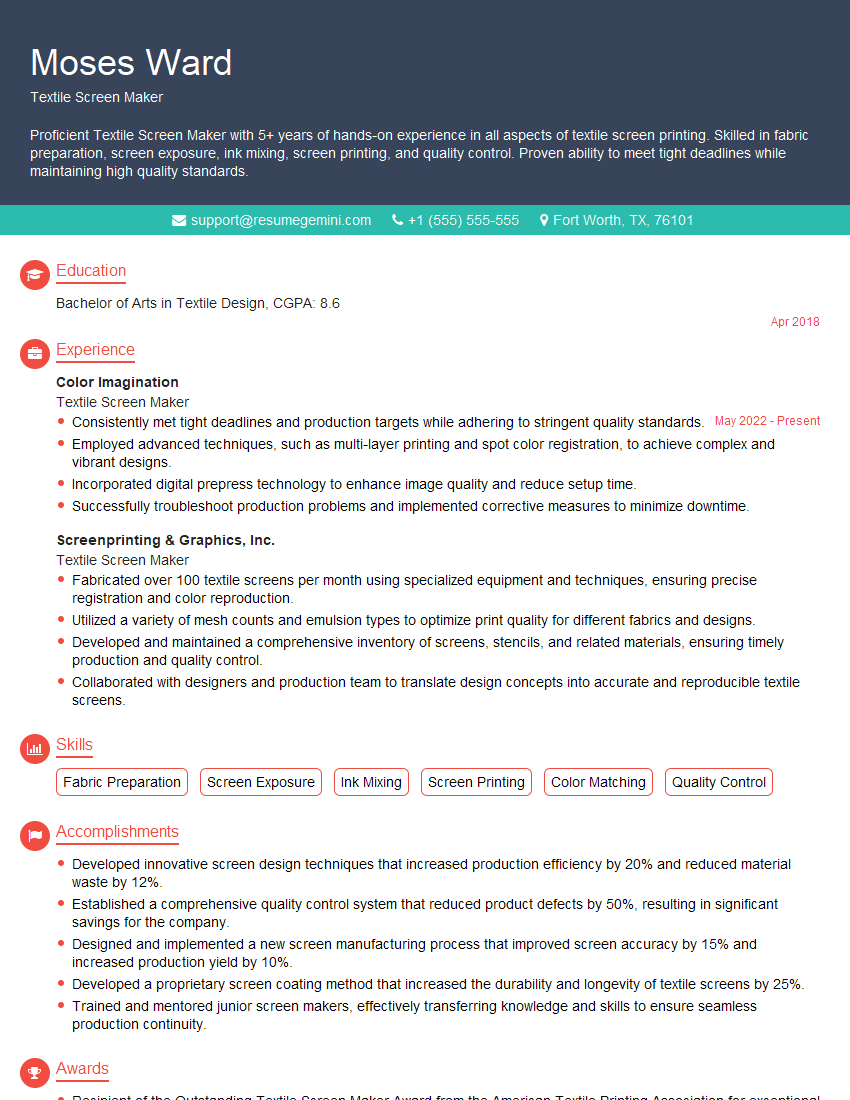Are you a seasoned Textile Screen Maker seeking a new career path? Discover our professionally built Textile Screen Maker Resume Template. This time-saving tool provides a solid foundation for your job search. Simply click “Edit Resume” to customize it with your unique experiences and achievements. Customize fonts and colors to match your personal style and increase your chances of landing your dream job. Explore more Resume Templates for additional options.

Moses Ward
Textile Screen Maker
Summary
Proficient Textile Screen Maker with 5+ years of hands-on experience in all aspects of textile screen printing. Skilled in fabric preparation, screen exposure, ink mixing, screen printing, and quality control. Proven ability to meet tight deadlines while maintaining high quality standards.
Education
Bachelor of Arts in Textile Design
April 2018
Skills
- Fabric Preparation
- Screen Exposure
- Ink Mixing
- Screen Printing
- Color Matching
- Quality Control
Work Experience
Textile Screen Maker
- Consistently met tight deadlines and production targets while adhering to stringent quality standards.
- Employed advanced techniques, such as multi-layer printing and spot color registration, to achieve complex and vibrant designs.
- Incorporated digital prepress technology to enhance image quality and reduce setup time.
- Successfully troubleshoot production problems and implemented corrective measures to minimize downtime.
Textile Screen Maker
- Fabricated over 100 textile screens per month using specialized equipment and techniques, ensuring precise registration and color reproduction.
- Utilized a variety of mesh counts and emulsion types to optimize print quality for different fabrics and designs.
- Developed and maintained a comprehensive inventory of screens, stencils, and related materials, ensuring timely production and quality control.
- Collaborated with designers and production team to translate design concepts into accurate and reproducible textile screens.
Accomplishments
- Developed innovative screen design techniques that increased production efficiency by 20% and reduced material waste by 12%.
- Established a comprehensive quality control system that reduced product defects by 50%, resulting in significant savings for the company.
- Designed and implemented a new screen manufacturing process that improved screen accuracy by 15% and increased production yield by 10%.
- Developed a proprietary screen coating method that increased the durability and longevity of textile screens by 25%.
- Trained and mentored junior screen makers, effectively transferring knowledge and skills to ensure seamless production continuity.
Awards
- Recipient of the Outstanding Textile Screen Maker Award from the American Textile Printing Association for exceptional skill and innovation in textile screen making.
- Recognized for superior craftsmanship and attention to detail, consistently producing highquality textile screens that met the most demanding specifications.
- Received the Textile Screen Maker of the Year Award from the National Textile Association for exceptional contributions to the industry.
- Honored with the Presidents Award for Excellence for consistently exceeding performance expectations and making significant contributions to the textile screen making team.
Certificates
- Certified Screen Printing Specialist (CSPS)
- International Screen Printing and Graphic Imaging Association (ISPGIA) Membership
- Occupational Safety and Health Administration (OSHA) General Industry Safety and Health Certification
- Six Sigma Green Belt
Career Expert Tips:
- Select the ideal resume template to showcase your professional experience effectively.
- Master the art of resume writing to highlight your unique qualifications and achievements.
- Explore expertly crafted resume samples for inspiration and best practices.
- Build your best resume for free this new year with ResumeGemini. Enjoy exclusive discounts on ATS optimized resume templates.
How To Write Resume For Textile Screen Maker
- Highlight your technical skills and experience in fabric preparation, screen exposure, ink mixing, screen printing, and color matching.
- Showcase your ability to work independently and as part of a team in a fast-paced environment.
- Quantify your accomplishments whenever possible, using specific numbers and metrics to demonstrate your impact.
- Tailor your resume to each job application, highlighting the skills and experience that are most relevant to the specific position.
Essential Experience Highlights for a Strong Textile Screen Maker Resume
- Prepare fabrics for screen printing, including cleaning, stretching, and coating.
- Expose screens using a variety of methods, including hand-cut stencils, photo emulsion, and digital imaging.
- Mix and prepare inks according to specifications, ensuring accurate color matching.
- Operate screen printing machines to print designs onto fabrics, using proper tension and alignment.
- Perform quality control inspections to ensure that printed fabrics meet specifications.
- Maintain and clean screens and printing equipment to ensure optimal performance.
- Troubleshoot and resolve printing issues to minimize downtime and maintain production schedules.
Frequently Asked Questions (FAQ’s) For Textile Screen Maker
What are the key skills required to be a successful Textile Screen Maker?
The key skills required to be a successful Textile Screen Maker include fabric preparation, screen exposure, ink mixing, screen printing, color matching, and quality control.
What are the different methods used for screen exposure?
The different methods used for screen exposure include hand-cut stencils, photo emulsion, and digital imaging.
How do I ensure accurate color matching in screen printing?
To ensure accurate color matching in screen printing, it is important to use calibrated equipment, mix inks according to specifications, and perform regular quality control inspections.
What are the common challenges faced by Textile Screen Makers?
Common challenges faced by Textile Screen Makers include maintaining consistent print quality, managing ink flow and color accuracy, and troubleshooting printing issues.
What are the career advancement opportunities for Textile Screen Makers?
Career advancement opportunities for Textile Screen Makers include becoming a Screen Printing Supervisor, Production Manager, or Technical Director.
Can Textile Screen Makers work in different industries?
Yes, Textile Screen Makers can work in a variety of industries, including fashion, home décor, and industrial manufacturing.
Is it possible to specialize in a particular area of textile screen printing?
Yes, it is possible to specialize in a particular area of textile screen printing, such as garment printing, fabric printing, or industrial printing.